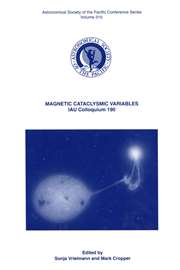No CrossRef data available.
Article contents
The Impact on Astronomy of the Discovery of Uranus
Published online by Cambridge University Press: 12 April 2016
Extract
The discovery of Uranus was a very much more important event than the addition of one primary planet to the Solar System. Indeed, it was to greatly influence future developments in a number of diverse regions. In this paper we shall consider its impact in three such areas: (l) the research on, and the acceptance of, the Titius-Bode Law; (2) the search for, and subsequent discovery of, a planet exterior to Uranus and (3) the direction of William Herschel’s own career.
- Type
- History of the Discovery of Uranus
- Information
- International Astronomical Union Colloquium , Volume 60: Uranus and the Outer Planets , 1982 , pp. 81 - 89
- Copyright
- Copyright © Cambridge University Press 1982
References
Notes
1. J.D. Titius von Wittenberg, translation into German from French of Betrachtung uber die Natur, vom Herrn Karl Bonnett (Leipzig, 1766)7. The translation given is from p. 1014 of S. L. Jaki’s “The early history of the Titius-Bode Law”, American Journal of Physics, 40 (1972), 1014-1023. Jaki’s paper gives a full account of the Law’s early history. On this see also Nieto, M. M., The Titius-Bode Law of planetary distances: Its history and theory, (Oxford 1972)Google Scholar chapters 1-6.
2. Bode, J.E., Anleitung zur Kenntniss des gestirnten Himmels (Hamburg, 1772)Google Scholar second edition, h62. See also Jaki, op.cit. ref. 1, 1015.
3. See Schaffer”, S. “The Great Laboratories of the Universe’: William Herschel on matter theory and planetary life” Journal for the History of Astronomy, 11 (1980), 81–111, pp. 96–100.CrossRefGoogle Scholar
4. See, for example, Ferguson, J., Astronomy explained upon Sir Isaac Newton’s principles…. (London, 1756) 30.Google Scholar
5. This point is made by S. Schaffer in “Uranus and the establishment of Herschel’s astronomy”, Journal for the History of Astronomy, 12 (1981), 11-26, p. 15.
6. Bode, J. E., Von dem neu entdeckten Planeten, (Berlin, 1784).Google Scholar
7. Jaki, op. cit. ref. 1, 1019.
8. See F. von Zach, “Öber einen zwischen Mars und Jupiter l’ángst vermutheten, nun wahrscheinlich entdecken neuen Hauptlaneten unseres Sonnen-Systems”, Monatliche Correspondenz zur Berförderung der Erd-und Himmels-Kunde, 3 (1801), 592-623.
9. Bode, J. E. Mémoires de l’Acadamie Royale des Sciences et Belles-Lettres (Berlin, 1804) 141.Google Scholar
10. A helpful account of the discoveries of Ceres and Pallas is given in Grant, R., History of physical astronomy from the earliest ages to the middle of the nineteenth century, (London, 1852), 238–240.Google Scholar
11. Olbers to Herschel, 17 June 1802, quoted in C. Lubbock, The Herschel chronicle, (Cambridge, 1933) 272.
12. Herschel, W., “Observations on the two lately discovered celestial bodies”, Philosophical Transactions, 92 (1802) 213–233.CrossRefGoogle Scholar
13. Op. cit. ref. 12, 228.
14. Op. cit. ref. 12, 228-230.
15. Maskelyne to Gauss, 18 October 1804, quoted in Forbes, E. “The correspondence between Carl Friedrich Gauss and the Rev. Nevil Maskelyne (1802-5)”, Annals of science, 27 (1971) 213–237, P. 235.CrossRefGoogle Scholar
16. Gilbert, L., “1st der Ophion, (ein Planet der Uranusbahn,) ein noch unbekannter Weltkörper?”, Annalen der Physik, 11 (1802), 482–485.Google Scholar
17. M. Grosser, The discovery of Neptune, (Cambridge, Mass., 1962) 47.
18. See Merleau-Ponty, J., “Laplace as Cosmologist” in Cosmology, History and Theology, (New York, 1977), edited by Yougrau, W. and Breck, A., 283–291.Google Scholar
19. See Grosser, op. cit. ref. 17.
20. Herschel, J., letter on “LeVerrier’s planet” Athenaeum, 3 October 1846, 109.Google Scholar
21. There had been earlier sightings but the planet had been mistaken for a star. It has recently been argued that Galileo saw Neptune: C. Kowal and Drake, S., “Galileo’s observations of Neptune”, Nature, 287 (1980) 311–313.Google Scholar
22. On the Law’s high reputation see the comments of J.P. Nicholl Professor of Astronomy at the University of Glasgow: The phenomena and order of the Solar System, (Edinburgh, 1838) 238.
23. See Lubbock, op. cit. ref. 11, 78-132.
24. See the article by Dr. Hoskin in this volume as well as his William Herschel and the construction of the Heavens, (London, 1963) and Schaffer, op. cit. ref. 5.


